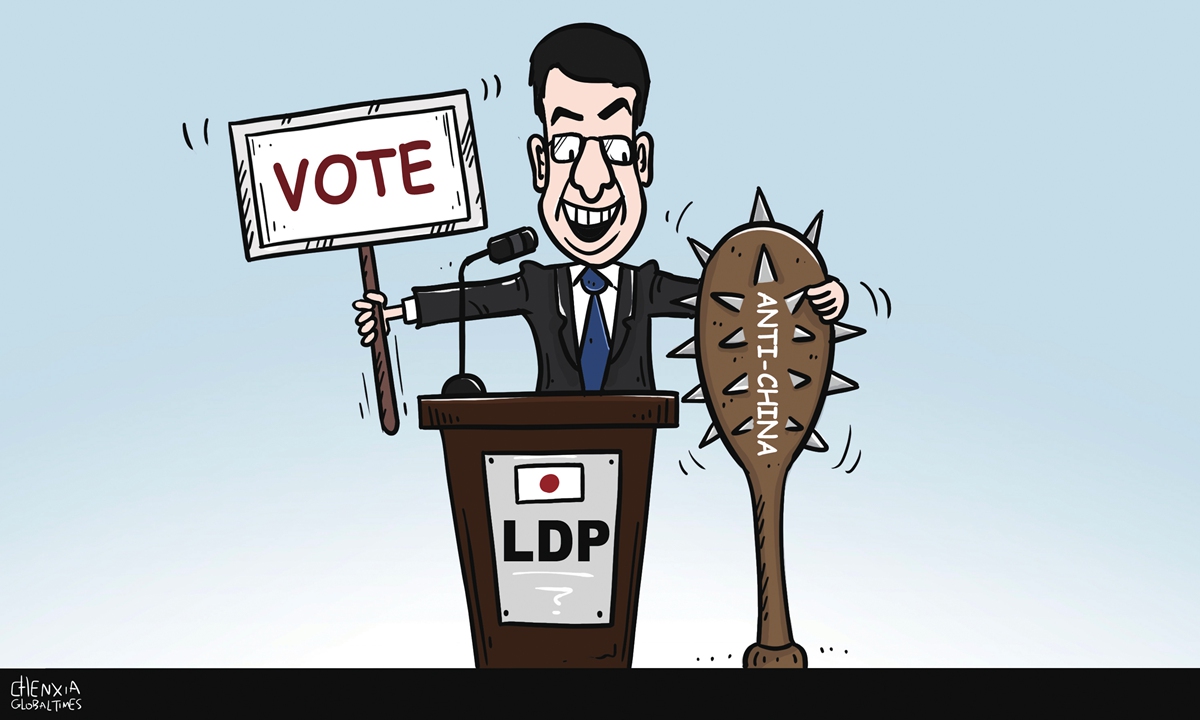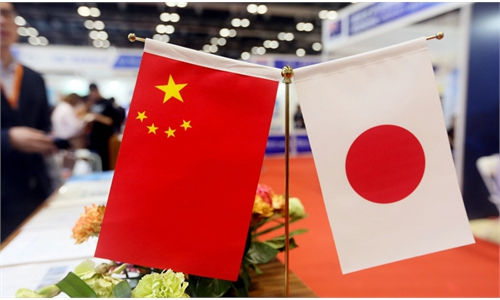
Illustration: Chen Xia/Global Times
Campaigning for the leadership race of Japan's ruling Liberal Democratic Party (LDP) to choose the successor to Prime Minister Yoshihide Suga officially began on Friday. The LDP election is set for September 29 and is being contested by former foreign minister Fumio Kishida, former communications minister Sanae Takaichi, vaccination minister Taro Kono, and Seiko Noda, executive acting secretary-general of the LDP.
The timing of the election is critical. Japan's next House of Representatives election is expected to take place in the months after October 21. Whether the LDP can maintain a stable majority in the lower house of parliament will be a political task for the newly-elected president.
Unsurprisingly, the candidates have all expressed a hard-line stance against China, despite varying degrees.
For instance, Takaichi has repeatedly stirred up troubles on the Taiwan question. She met online with regional leader of Taiwan island Tsai Ing-wen on Monday. Takaichi has a very conservative political stance and values. In Japan, one of the most important characteristics of extreme conservatives is being anti-China. They will not hesitate to confront China by all means.
On the Taiwan question, Japan's extreme right-wing and conservative politicians have a clear political position: They do not want to see China's complete reunification, or even the status quo of peace on both sides of the Taiwan Straits. They hope to stir up troubles through the Taiwan question and create an image of a weak Taiwan; thereby hyping up Japanese public opinion to support "Taiwan independence," Or to support Taiwan's policy of drawing closer to Japan.
Given the current strategic competition between China and the US, as well as structural contradictions between China and Japan, if the LDP candidates do not attack China in their proposed policies, they will be considered as being weak toward Beijing.
Since Suga took office, China-Japanese relations have worsened rapidly. The political mutual trust accumulated between the two sides in the later period of Shinzo Abe administration has weakened.
The LDP candidates raise their anti-China tune to conform to the public opinion. They are competing over who can be harsher against Beijing with a comprehensive set of agenda. This ranges from affairs in Hong Kong, Xinjiang, the Taiwan island, the Diaoyu Islands, and economic security.
For example, Kishida, who made his first bid for LDP president as early as last year, is a representative of liberal politicians within his party. His policy is known for being moderate. Yet after Kishida announced to join the leadership race, he has repeatedly used offensive remarks in public occasions to win the attention of the audiences, trying to create an image of a hard-line politician by attacking China. On the contrary, Noda, who made a last-minute announcement on her candidacy for the party's presidential election last week, has showed a relatively moderate policy toward China. Yet she has been thus criticized by Japanese public opinion and netizens for being a weak politician.
Candidates' are playing up anti-China rhetoric to please the voters. This also reflects the deterioration of China-Japan relations. In addition, the impact from the US cannot be neglected. The China-US strategic competition began when China's relationship with Japan were eased. When the strategic competition between Beijing and Washington became increasingly fiercer, the US showed a strong call for Japan to take its side. Abe, as a powerful politician, was able to show his independent China policy. But after Suga assumed office, Japanese politicians have become more and more subservient toward Washington's demands. They are turning an anti-China mind-set into consensus in the country's political arena. Compared with other US Western allies, Tokyo is more constrained by its alliance with Washington and lacks flexibility when it comes to diplomacy with China.
From the perspective of either geographic location or economic ties, China-Japan relations are different from the ones between China and the US. Following the US lead will not address the plight Japan is encountering in East Asia. As two major countries with vital roles in East Asia, China and Japan have broad consensus on regional cooperation. China has officially applied to join the Comprehensive and Progressive Agreement for Trans-Pacific Partnership (CPTPP), in which the US does not have a membership. In fields involving China-Japan relations, what is in need is Tokyo's strategic autonomy, rather than following the lead of the US - let along blind anti-China slogans. If more anti-China efforts are made in the LDP presidential election, Japan will suffer more in the end.
The author is an associate research fellow at the Center for Japanese Studies, Fudan University. opinion@globaltimes.com.cn

